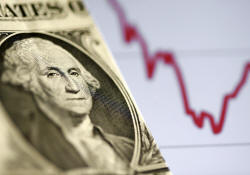U.S. dollar: When will bulls turn to bears?
 Send a link to a friend
Send a link to a friend
 [August 07, 2019] By
Gertrude Chavez-Dreyfuss [August 07, 2019] By
Gertrude Chavez-Dreyfuss
NEW YORK (Reuters) - Trump wants it to be
cheaper. The IMF says it should be cheaper. Hedge funds think it has
room to run. So what gives with the dollar?
Since the trade war between the world's two largest economies erupted in
March last year, the dollar has gained more than 3 percent against a
basket of currencies.
(Graphic: Revised dollar and trade war - https://tmsnrt.rs/2YoYiPI)
The dollar's strength, however, does not sit well with President Donald
Trump, who has advocated for a weaker currency to make U.S. exports more
competitive. On Monday, the U.S. Treasury labeled China a currency
manipulator for allowing the yuan to weaken beyond a key level.
Trump feels that U.S. trading partners, the Chinese in particular, are
all working frantically to keep their currencies cheap to gain an edge
in trade.
His rhetoric has led to speculation that the U.S. government, through
the Treasury, could intervene to weaken the dollar by using the Exchange
Stabilization Fund. That is seen as unlikely. That fund has
approximately $146 billion in reserves, according to Bank of America
Merrill Lynch, which may not be enough to have a significant impact in a
more than $5 trillion currency market.

Trump is not the only one who believes the dollar should be weaker. The
International Monetary Fund says the dollar ought to be about 6-12
percent cheaper based on near-term economic fundamentals, but structural
issues such as the greenback's position as the global reserve currency
make that unlikely.
But week after week, hedge funds keep piling up bets that the dollar's
surge has further to run as the world appears headed toward a
trade-induced pause in growth if not outright recession.
So who's right? Here are the arguments:
BULLISH SCENARIO
Being bullish on the dollar has been a popular trade. Bank of America
Merrill Lynch's July fund manager survey showed the dollar was the
fourth most crowded trade with 49 percent of respondents saying it is
overvalued. The speculative community has been net long dollars since
mid June last year.
(Graphic: U.S. dollar futures positioning - https://tmsnrt.rs/2MNID5L)
Bulls say the dollar could benefit from increasing trade tensions.
"It's a safe haven and offers a very liquid store of value," said Mazen
Issa, senior FX strategist at TD Securities, who said there are very few
alternatives to the dollar in the event of a full-scale trade war with
China.

[to top of second column] |

A U.S. dollar note is
seen in front of a stock graph in this November 7, 2016 picture
illustration. Picture taken November 7. REUTERS/Dado Ruvic/Illustration

Foreign investors also tend to buy U.S. Treasuries as a safe haven hedge,
analysts said.
Further enhancing the dollar's and Treasuries' appeal is the yield premium over
their counterparts.
Seema Shah, chief strategist at Principal Global Investor, said that with more
than 40 percent of non-U.S. bonds trading at negative yields, Treasuries have
become high yielders.
BEARISH VIEW
While the trade tension has benefited the dollar as a safe haven, there is an
argument that the trade stress could undermine the greenback because it would
have an adverse impact on the U.S. economy.
Analysts said trade tensions could diminish business and consumer confidence as
well as tighten financial conditions.
"We feel that the escalation in the trade war is a risk to the U.S. economy that
would prompt the Fed to ease more," said Richard Franulovich, head of FX
strategy at Westpac in New York.
Interest rate futures implied traders fully expect the Fed to lower rates again
at its policy meeting next month, after cutting rates last week for the first
time in a decade, CME Group's FedWatch showed on Tuesday.
"We're starting to get to a point now where it seems that the more hostile the
U.S.-China trade war becomes, the more bearish it's becoming for the dollar, and
of course we didn't quite see that in the early days of the trade war," said
Bipan Rai, head of FX strategy at CIBC in Toronto.

Increasing U.S. debt could also weigh on the greenback, analysts have said.
Zhiwei Ren, portfolio manager at Penn Mutual Asset Management, said it is hard
to envision a bullish scenario for the dollar at this point even though the U.S.
economy has outperformed the rest of the world.
"The dollar has been strong for the last two to three years," Ren said. "It's
very hard for one country to stay strong for too long."
(Reporting by Gertrude Chavez-Dreyfuss; additional reporting by Karen Brettell
and April Joyner; editing by Megan Davies and Leslie Adler)
[© 2019 Thomson Reuters. All rights
reserved.] Copyright 2019 Reuters. All rights reserved. This material may not be published,
broadcast, rewritten or redistributed.
Thompson Reuters is solely responsible for this content. |